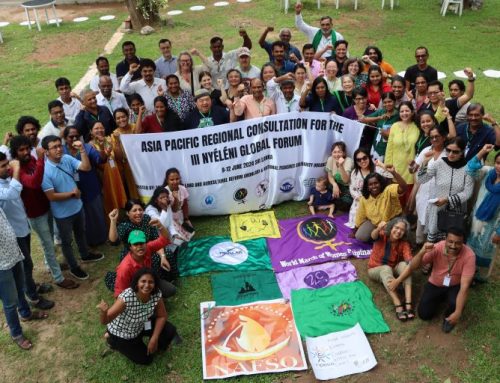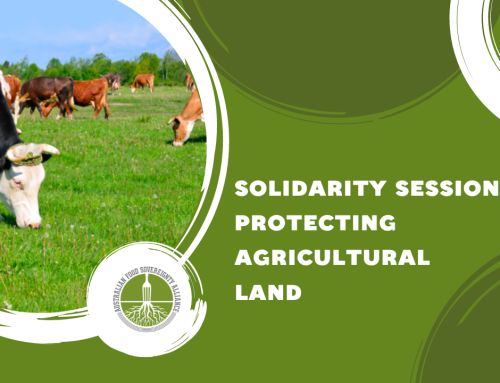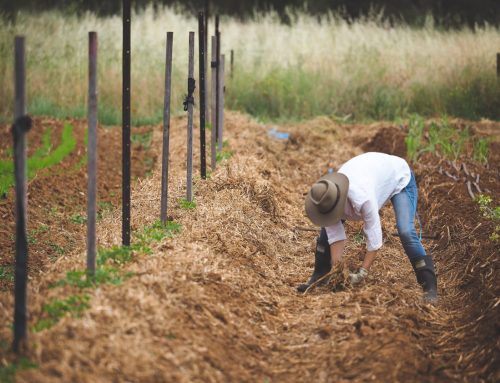Call for your contributions to the UN Committee on World Food Security Food Systems and Nutrition policy guidelines – online submissions open soon and we want to ensure that grassroots and small-scale voices are heard. Read on below to find out about the CFS, the consultation on voluntary guidelines, and why its important to add your voice.
Key points
- Regional consultation for Asia and the Pacific: Bangkok (Thailand) July 25 & 26, 2019
- Online consultation portal opening soon.
- Stay tuned for the CSM vision document outlining the collective positions of participating movements and organisations in the Working Group. This will provide a reference point and guide to help you develop your own submission – if many submissions emphasise the key messages we have a better chance of having our inputs reflected in the final policy guidelines. For more information email international@afsa.org.au
- Sign up to participate in the CSM working group on Food Systems and Nutrition by emailing the CSM Secretariat: cso4cfs@gmail.com
What is the UN Committee on World Food Security, and why is it important?
In 2009, the UN Committee on World Food Security (CFS) was reformed with a new mandate: to address the persistent problems of global hunger and malnutrition, by facilitating policy convergence by governments toward the progressive realisation of the Right to Food.
What makes the CFS different from other UN bodies is its unique participatory structure: civil society, social movements, and indigenous peoples – small-scale food producers of all kinds (fisherfolk, farmers, forest peoples, pastoralists, landless peoples), food workers and urban food insecure – in particular youth and women – are recognised as important contributors to debate and policy development.
In other words – it seeks contributions from those who produce more than 70% of the world’s food, and are the primary stewards of bio-cultural diversity. Appallingly, it is these same peoples who are the most affected by hunger and malnutrition across the globe.
The Civil Society and Indigenous People’s Mechanism (CSM) was created to include and prioritise these voices in food policy debates and decisions in the Committee. NGOs, consumer groups, academics, research institutions, and other allied organisations and networks are also important participants who can support the struggles of those most affected by showing up, listening, and supporting in concrete ways.
Participants in the CSM bring together many perspectives and voices, one of our greatest strengths. In this diversity, our unity is affirmed by our collective work to hold national governments accountable to their human rights obligations – which include their duties to respect, uphold, and fulfil the right to safe, nutritious and adequate food. The CSM provides the opportunity for civil society organisation and grassroots movements to contribute the the Guidelines.
Why participate in the development of the Voluntary Guidelines on Food Systems and Nutrition?
Grassroots movements and organisations fought hard for the CSM and the right to participate in the Committee in a meaningful way. Now we need to continue to engage in this space to advocate for a more just, equitable, and sustainable food system – underpinned by the principles of food sovereignty and agroecology. Food systems are at a crossroads: unsustainable and profit-driven industrial agribusiness destroying people’s livelihoods and the planet, versus diversified, agroecological production systems, localised economies, decent wages and living conditions, and a respect for planetary boundaries. This latter aspiration is not ready made – it’s something we have to co-create and constantly work to affirm.
Why should I contribute to the CFS Food System and Nutrition policy guidelines?
- CFS policy instruments are tools that grassroots organisations and movements can use to hold governments accountable and to push for concrete legal, regulatory, and policy changes at regional, national, and subnational levels.
- As of June 2019, the “Zero Draft” guidelines are missing some key elements.
- The current draft is overly focused on a highly technical vision of nutrition. This vision privileges industrial innovations – biofortification, GMOs, and engineered foods, erasing the cultural basis of all food systems.
- The interdependent root causes of malnutrition – poverty, inequality, and a lack of social, economic, and political rights – particularly for women, youth, and indigenous peoples and people of colour – need to be clearly addressed in the guidelines.
- The central role of governments – those who hold the primary responsibilities for addressing these food system dysfunctions in an integrated way – also needs to be articulated much more strongly.
Good nutrition is provided by minimally processed, diverse, safe and culturally preferred foods. It depends on clean water, healthy soils and access to productive resources, infrastructure, and decent work. These interdependent elements are what the term “food system” refers to, but these elements are missing from or insufficiently elaborated in the zero draft.
The so called “private sector” – aka big agribusiness – also has a strong voice in the Committee, through its own Private Sector Mechanism. Big agri-business companies use this mechanism to push their vision of a “new green revolution”. Their glossy vision of a “sustainable future” is full of piecemeal, high-tech, capital-intensive “innovations”. Unfortunately these so-called innovations are nothing new. It’s still a system that is driving climate change and concentrating wealth and control of food systems in the hands of a few. Our issue is not with technology itself – but we need a critical assessment of what technology, by whom, and to what end.
What do we do?
What’s the good of democracy if we don’t exercise our rights as political subjects?
- One way of doing so is to participate in the development of these policy guidelines – and then use them to push our governments to get serious about action.
- Our participation means a strong voice advocating for land tenure rights, clean water, indigenous sovereignty, control over peasant seeds, breeds, and knowledge, and the right to education, health, housing, and decent work.
How can I get involved?
- Regional consultation for Asia and the Pacific will be held in Bangkok (Thailand) on July 25 & 26 2019
- Online consultation portal opening where you can add your submission ahead of the consultation meeting.
- Download the “Zero Draft” of the guidelines here. Please note: the structure of Section III will be completely transformed in the final draft.
- CSM preliminary comments on the zero draft were made at the June meeting of the CFS Open Ended Working Group – View the webcast of our interventions, or email us for a summary of our points.
- Stay tuned for the CSM vision document outlining the collective positions of participating movements and organisations in the Working Group. This will provide a reference point and guide to help you develop your own submission – if many submissions emphasise the key messages we have a better chance of having our inputs reflected in the final policy guidelines. For more information email international@afsa.org.au
- Sign up to participate in the CSM working group on Food Systems and Nutrition by emailing the CSM Secretariat: cso4cfs@gmail.com
- Join AFSA in our collective work to create an equitable, sustainable and resilient food system for all. As an active participant in the CSM, as well as the global peasant movement La Vía Campesina and the International Planning Committee for Food Sovereignty IPC), we are working hard to bring your voices to international spaces, and report back to you on ongoing processes.
For more information and background on the CFS Food Systems and Nutrition policy convergence process please see the CFS Workspace: http://www.fao.org/cfs/workingspace/workstreams/nutrition-workstream/en/




